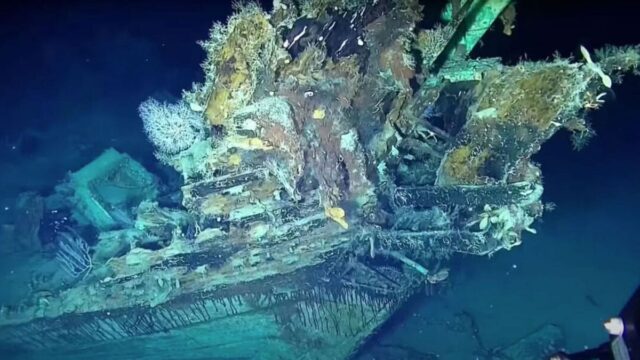The ‘holy grail of shipwrecks’ has remained underwater for more than 300 years due to disputes over its ownership.
Despite having been sunken for 300 years in the dark depths of the Caribbean Seahe San José galleon has managed to bring international tensions to the surface. Found for the first time in 2015 by the Colombian Government, its exact location has remained hidden, under state secrecy, to avoid looting.
“This is the most valuable treasure ever found in the history of humanity“said former Colombian president Juan Manuel Santos, in a statement, after the discovery of the wreck.
It is estimated that the wreck contains a treasure valued at 18,000 million euros. Among the objects he transported were pieces of glass, porcelain, emeralds and gold and silver coins.
What is the San José galleon?
Launched in 1698, the galleon San José belonged to the Spanish Navy. She had 64 guns, three masts and three decks, and was destined to be part of the so-called ‘Spanish treasure fleet’ that traded different items across the Atlantic Ocean, in search of riches.
The ship participated in the war that began in 1701 in Spain with the dispute over the succession to the country’s throne, after the death of Charles II of Habsburg, who was known by the nickname ‘the Bewitched‘.
On a hot afternoon in June 1708, while anchored in Colombian waters, the galleon was attacked by a squadron of British ships led by commander Charles Wager. The largest of them was called ‘Expedition’. As he approached to approach him, there was a sudden explosion in the San José galleon, according to a research paper published in the ‘Mariner’s Mirror’. Only 11 crew members survived, while another 600 perished in the tragic event.
Disputes over loot
Ownership of the galleon remains highly disputed, which has caused it to languish 600 meters deep, on the seabed. Although the wreck was found in Colombian waters, Spain maintains that it was part of the Spanish fleet and that it belongs to it.
For its part, the American rescue company Sea Search Armada, SSA, claims to have located, 42 years ago, the area in which the galleon sank. This has led to a long legal battle between the Colombian Government and SSA, which demands a 50% distribution of the profits.
Bolivian indigenous communities have also claimed some of the treasures, which could have been extracted in Bolivian lands for his ancestors.
Now, finally, the Colombian authorities have begun a recovery process estimated at around 4.5 million US dollars (around 4.2 million euros), starting with the so-called ‘characterization phase’.
According to the Colombian Institute of Anthropology and History, sensors are being used to generate an image of the archaeological material what is found on the seabed for an inventory, while robots used to conduct deep dives have been taking data to help inform academic studies.
The next steps will be determined by the discoveries of this initial phase and, at the moment, there are no plans to carry out archaeological excavations.
“It is time to reclaim the heritage elements for which they should be valued the remains of the galleon“, declared at the beginning of the year the Minister of Cultures, Arts and Knowledge of Colombia, Juan David Correa, also insisting that “history is the treasure.”







